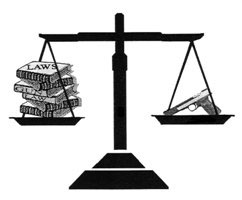 The US Supreme Court on Dec. 7 refused to hear a Second Amendment challenge to a Chicago suburb’s ordinance that banned semiautomatic assault weapons and large-capacity magazines.
The US Supreme Court on Dec. 7 refused to hear a Second Amendment challenge to a Chicago suburb’s ordinance that banned semiautomatic assault weapons and large-capacity magazines.
The case, Friedman v. City of Highland Park, No. 15-133, concerned an ordinance in Highland Park, IL. It was, enacted in 2013.
“Sandy Hook had just happened,” Nancy R. Rotering, the city’s mayor, recalled in reference to the mass shooting at a Newtown, CT, elementary school. “It was a common-sense step to reduce gun violence and to protect our children and our community.”
The ordinance banned some weapons by name, including AR-15s and AK-47s. More generally, it prohibited possession of what it called “assault weapons,” defining them as semi-automatic guns that can accept large-capacity magazines and have features like a grip for the non-trigger hand. Large-capacity magazines, the ordinance said, are those that can accept more than 10 rounds. A federal assault weapons ban, including a prohibition on high-capacity magazines, expired in 2004.
The decision not to hear the case has no precedential force, but was nonetheless part of a series of signals from the Supreme Court giving at least tacit approval to even quite strict gun control laws in states and localities that choose to enact them.
“The justices don’t reveal their reasons for denying review, but one thing is clear,” said Adam Winkler, a law professor at the University of California, Los Angeles. “The justices certainly aren’t eager to take up a Second Amendment case these days.”
The court will sooner or later return to the subject of the scope of the Second Amendment right first recognized in 2008 in District of Columbia v. Heller, which struck down parts of an exceptionally strict local law that barred keeping guns in the home for self-defense. But the justices do not seem eager to do so even as the nation is in the midst of a sharp debate over gun control in the wake of shooting rampages in San Bernardino, Calif., and across the nation.
In dissent, Justice Clarence Thomas, joined by Justice Antonin Scalia, accused the court of abdicating its responsibility to enforce the constitutional right to keep and bear arms. (Justice Scalia wrote the majority opinion in the Heller case, which was decided by a 5 to 4 vote.)
“Roughly five million Americans own AR-style semi-automatic rifles,” Justice Thomas wrote, referring, he said, to “modern sporting rifles.”
“The overwhelming majority of citizens who own and use such rifles do so for lawful purposes, including self-defense and target shooting,” Justice Thomas wrote. “Under our precedents, that is all that is needed for citizens to have a right under the Second Amendment to keep such weapons.”
Since 2010, the Supreme Court has turned away appeals in any number of Second Amendment challenges to gun control laws.
The ordinance was challenged by the Illinois State Rifle Association and Dr. Arie S. Friedman, who at his home had kept guns and magazines for self-defense that were banned by the ordinance. The term “assault weapons,” they told the justices, “is an imaginary and pejorative category.”
The Illinois rifle group and Dr. Friedman urged the Supreme Court to address what they called “the lower courts’ massive resistance to Heller and their refusal to treat Second Amendment rights as deserving respect equal to other constitutional rights.”
A supporting brief filed by 24 states said the ordinance “bans many commonly used firearms and the standard capacity magazines for many popular firearms.”
In April, a divided three-judge panel of the United States Court of Appeals for the Seventh Circuit, in Chicago, upheld the Highland Park ordinance.



